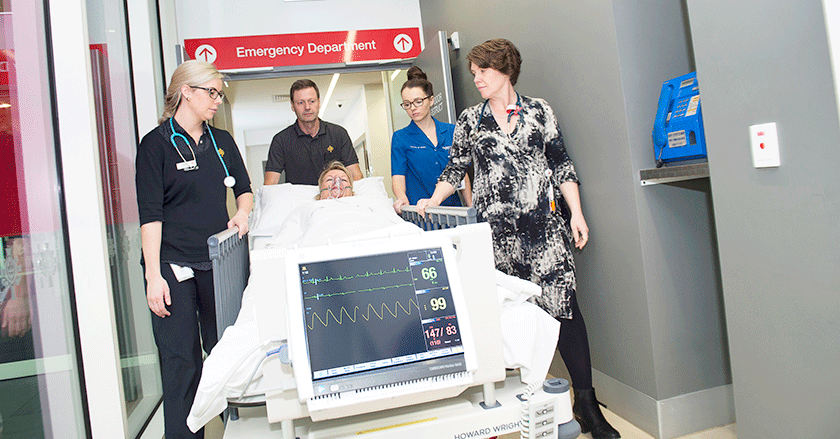- Our services
- Emergency Department
Emergency Department
Coronavirus (COVID-19) precautions
If you are seeking assistance, or testing for Coronavirus (COVID-19), contact your GP.
If you need urgent assistance, please present to our Emergency Department and put on a mask on arrival.
If you are identified as a close contact of a COVID-19 positive case or if you are COVID-19 positive and need to attend our Emergency Department, we ask that you please call us ahead of your visit on (02) 4560 5508. This is important for us to know so we can implement additional infection control measures and minimise the risk of possible transmission.
If you experience a deterioration in your condition such as breathlessness or dizziness or other life threatening emergency, please call 000 (triple zero) immediately and ask for an ambulance.

If you have a life-threatening medical condition, call 000 and ask for an ambulance.
Our services
We provide adult and paediatric emergency services free of charge to public patients who hold a valid Medicare card.
If you are visiting from overseas, you may be ineligible to receive treatment under Medicare and will be billed for the cost of your treatment. This includes diagnostic investigation such as radiology or pathology, which will be billed directly by our service provider. Our caregivers can assist you with more information.
For non-urgent medical conditions, please visit your doctor or call Healthdirect on 1800 022 222. To find an after-hours doctor, please visit www.doctorclosed.com.au
What to do in an emergency
If you have a life-threatening medical condition, call 000 and ask for an ambulance.
If you have an urgent medical condition you can also come to our Emergency Department. If possible please bring with you:
- your Medicare Card
- any other entitlement cards (health care, pension, veterans, safety net)
- your passport/health insurance details (overseas visitors/students)
- private health insurance details (if you want to be admitted as a private patient)
- a list of your current medications
- any x-rays/ultrasounds/scans that may be related to your condition
- your employment contact details if your condition is covered by Workers’ Compensation
- the name of your General Practitioner (GP).
You will be seen as soon as possible, according to the severity of your illness, and not in order of attendance. If another patient comes to the Emergency Department with a more serious condition, you may be required to wait. We thank you for your patience and understanding.
When you arrive
Please see the triage nurse first. They will ask questions and assess your condition to determine your level of priority:
- immediate (life threatening)
- very urgent
- urgent
- standard
- non-urgent
You may need to be taken straight into the department or directed to the waiting room.
While you are waiting, please inform the triage nurse if your condition changes or you decide to seek treatment elsewhere.
What happens next?
Once you are inside the Emergency Department, our nurses and doctors will complete a thorough assessment of your conditions.
Tests and procedures will be carried out when necessary. The team will review your test results and provide emergency treatment, and will then decide to either:
- allow you to return home with a referral for further care if necessary (such as a follow-up appointment with your local doctor or an outpatient appointment)
- monitor your condition for a few hours before making a decision regarding your care
- admit you to hospital for further care or transfer you to a tertiary hospital for further treatment.
Sometimes you may need to wait for test results or for a ward bed to become available. We will continue to care for you until you are able to go to a ward or be discharged home.

